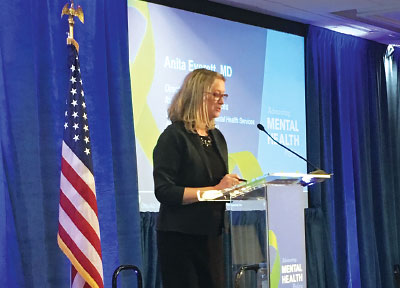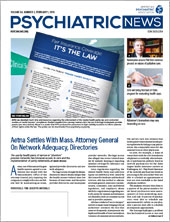Imagine this: you’re at work and your cell phone rings. It’s the school nurse summoning you because there’s been an “incident” at your son Jeremy’s school. You know he has been stressed and not sleeping well, preparing for his SAT tests and applying to colleges. Lately he’s been saying things like his “teacher was trying to trick him with paradoxical exam questions.” When you arrive at school, you learn your son threw a book at his teacher.
Now, imagine your family had no immediate association with a mental health clinic. What would you do? Rush him to the emergency room, in the hope that someone with psychiatric experience could see him? Have him hospitalized? Take him home and try to obtain an appointment with a psychiatrist or at a clinic? Would the teacher press charges for assault, and would Jeremy now have a criminal record?
Now, imagine that your son instead had a sports-related injury and had broken a bone. He would be immediately stabilized by an emergency room physician, trained and experienced in this type of injury, and within hours he would be in an operating room being treated by an orthopedic surgeon.
“It’s a very different situation than the wide unknown that can happen with a mental health situation,” explained Anita Everett, M.D., immediate past president of APA, who told the story at the Advancing Mental Health Policy Forum recently held by Otsuka Pharmaceutical.
“We have laws governing parity in payment, but we need parity in the mental health delivery system. Parity is a big idea that we need to embrace in its full extent,” said Everett, who also serves as chief medical officer of the Substance Abuse and Mental Health Services Administration (SAMHSA) and director of its Center for Mental Health Services.
Over the last several years, SAMHSA has been sharply criticized for not addressing mental health service delivery as well as the needs of individuals with serious mental illness, Everett said. To move forward, the agency is following a blueprint drawn up by the Interdepartmental Serious Mental Illness Coordinating Committee (ISMICC), a high-level committee created by the 21st Century Cures Act.
SAMHSA is focused on the five main recommendations made by ISMICC, which include the following: improving coordination across federal departments, boosting treatment access and engagement, focusing on evidence-based treatment and recovery, eliminating or reducing unnecessary involvement with criminal justice for children and adults with mental illness, and creating new financing strategies.
The Certified Community Behavioral Health Clinics (CCBHCs) is one model of care that embodies many of these goals and is being tested in eight states, Everett said. Now one-third of the way through its demonstration project, CCBHCs are beginning to show evidence of success. Whereas individuals in crisis have waited an average of six months to see a clinician, CCBHCs are required to triage such patients on the same day or by the next day, she said. In addition, CCBHCs’ payment mechanism covers the real cost for delivering such services, allowing clinics to offer a competitive salary and attract needed staff to provide the care that is needed.
APA Helps Advance Parity, New Care Models
Although the Mental Health Parity and Addiction Equity Act was enacted 10 years ago, overall consumer awareness of the law remains low, explained David Lloyd, national senior policy advisor and Illinois director of policy at the Kennedy Forum, during a panel discussion on mental health parity. Its “Don’t Deny Me” campaign is aimed at increasing provider and consumer awareness of the law. In addition, its “Parity at 10” is a three-year campaign now under way to unite advocates in several states—Illinois, Maryland, New Jersey, New York, and Ohio—to pursue full enforcement of the federal parity law. The Kennedy Forum plans to develop effective models for implementing mental health and substance abuse parity and then disseminate those across the country.
Tim Clement, APA’s Northeast regional field director of state government relations, said that a common parity concern of psychiatrists is the nightmarish prior-authorization requirements imposed by health plans. Such requirements can be a parity violation. “Psychiatrists are going to bat for their patients, who are oftentimes in desperate need of treatment. They cannot fight for themselves or navigate these complicated systems.”
Boosting provider awareness of the mental health parity law is key, Clement said. “When an insurance company realizes that the provider on the front line is very knowledgeable about parity, it sometimes backs off and approves the care. It can make the difference between someone getting the care they need or not.”
Michelle Dirst, APA’s director of practice management and systems delivery, participated in a panel discussion called “Incentivizing Quality Care.” She explained how APA has helped expand adoption of the Collaborative Care Model, for which psychiatrists serve as consultants to care managers and primary care providers who treat psychiatric patients. With support from the Centers for Medicare and Medicaid Services and SAMHSA, this take on collaborative care that started in Washington state has now been expanded to 3,000 psychiatrists throughout the country. ■
Information on the “Don’t Deny Me” campaign can be accessed
here.

